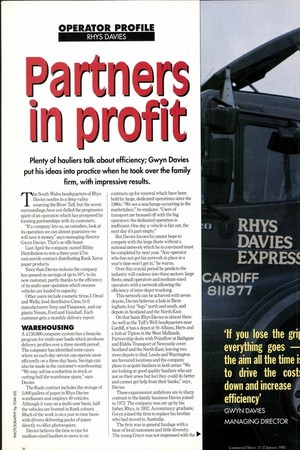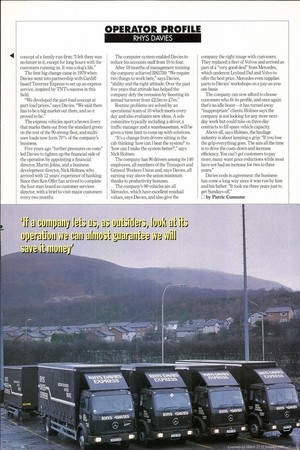Partari Jr1 (-irrofit Plenty of hauliers talk abou
Page 38

Page 40

If you've noticed an error in this article please click here to report it so we can fix it.
Partari Jr1 (-irrofit Plenty of hauliers talk about efficiency; Gwyn Davies put his ideas into practice when he took over the family firm, with impressive results.
The South Wales headquarters of Rhys Davies nestles in a deep valley sourcing the River Taff, but the scenic surroundings have not dulled the progressive spirit of an operation which has prospered by forming partnerships with its customers.
"If a company lets us, as outsiders, look at its operation we can almost guarantee we will save it money" says managing director Gwyn Davies. That's no idle boast.
Last April the company ousted Bibby Distribution to win a three-year/£7m nationwide contract distributing Rank Xerox paper products.
Since than Davies reckons the company has passed on savings of up to 10% to its new customer, partly thanks to the efficiency of its multi-user operation which ensures vehicles are loaded to capacity Other users include cosmetic firms L'Oreal and We11a; food distributor Cima; hi-fl manufacturers Sony and Panasonic, and car giants Nissan, Ford and Vauxhall. Each customer gets a monthly delivery report.
WAREHOUSING A £150,000 computer system has a bespoke program for multi-user loads which produces delivery profiles over a three-month period. The computer has identified some cases where an each-thy service can operate more efficiently on a three-day basis. Savings can also be made in the customer's warehousing: "We may advise a reduction in stock or cutting half the warehouse space," says Davies.
The Rank contract includes the storage of 5,000 pallets of paper in Rhys Davies warehouses and employs 40 vehicles. Although it runs on a multi-user basis, half the vehicles are liveried in Rank colours. Much of the work is on a just-in-time basis with drivers delivering packs of paper directly to office photocopiers.
Davies believes the time is ripe for medium-sized hauliers to move in on contacts up for renewal which have been held by large, dedicated operations since the 1980s. "We see a seachange occurring in the marketplace," he explains. "Users of transport are brassed off with the big operators: the dedicated operation is inefficient One day a vehicle is flat out, the next day it's part empty" But Davies knows he cannot hope to compete with the large fleets without a national network which he is convinced must be completed by next year. "Any operator who has not got his network in place in a year's time won't get in," he warns.
Over this crucial period he predicts the industry will coalesce into three sectors: large fleets; small operators and medium-sized operators with a network allowing the efficiency of inter-depot trunking.
This network can be achieved with seven depots, Davies believes: a hub in Birmingham, four "legs" north and south, and depots in Scotland and the North-East On that basis Rhys Davies is almost there. As well as the Taff's Well headquarters near Cardiff, it has a depot at St Albans, Herts and a hub at Tipton in the West Midlands. Partnership deals with Prizeflow at Bathgate and Elddis Transport of Newcastle cover Scotland and the North-East, leaving two more depots to find. Leeds and Warrington are favoured locations and the company plans to acquire hauliers in both areas: "We are looking at good quality hauliers who are not on their arses but feel they could do better and cannot get help from their banks," says. Davies.
These expansionist ambitions are in sharp contrast to the family business Davies joined in 1972. The company was set up by his father, Rhys, in 1952. Accountancy graduate, Gwyn joined the firm to replace his brother who had moved to Australia.
The firm was in general haulage with a base of local customers and little diversity. The young Gwyn was not impressed with the concept of a family-run firm: "I felt there was no future in it, except for long hours with the customers running us. It was a dog's life."
The first big change came in 1979 when Davies went into partnership with Cardiffbased Taverner Express to set up an express service, inspired by TNT's success in this field.
"We developed the part-load concept at part-load prices," says Davies. "We said there has to be a big market out there, and so it proved to be."
The express vehicles sport a brown livery that marks them out from the standard green on the rest of the 90-strong fleet, and multiuser loads now form 70% of the company's business.
Five years ago "further pressures on costs" led Davies to tighten up the financial side of the operation by appointing a financial director, Martin Johns, and a business development director, Nick Holmes, who arrived with 12 years' experience of banking. Since then Ken Offer has arrived to complete the four-man board as customer services director, with a brief to visit major customers every two months.
The computer system enabled Davies to reduce his accounts staff from 10 to four.
After 18 months of management training the company achieved BS5750: "We require two things to work here," says Davies, "ability and the right attitude. Over the past five years that attitude has helped the company defy the recession by boosting its annual turnover from £2.5m to £7m."
Routine problems are solved by an operational team of 10 which meets every day and also evaluates new ideas. A subcommittee typically including a driver, a traffic manager and a warehouseman, will be given a time limit to come up with solutions.
"It's a change from drivers sitting in the cab thinking 'how can I beat the system?' to 'how can I make the system better?'," says Nick Holmes.
The company has 90 drivers among its 140 employees, all members of the Transport and General Workers Union and, says Davies, all earning way above the union minimum thanks to productivity bonuses.
The company's 90 vehicles are all Mercedes, which have excellent residual values, says Davies, and also give the company the right image with customers. They replaced a fleet of Volvos and arrived as part of a "very good deal" from Mercedes, which undercut Leyland Daf and Volvo to offer the best price. Mercedes even supplies parts to Davies' workshops on a pay-as-youuse basis The company can now afford to choose customers who fit its profile, and once again that's no idle boast—it has turned away "inappropriate" clients. Holmes says the company is not looking for any more nextday work but could take on three-thy contracts to fill spare vehicle capacity.
Above all, says Holmes, the haulage industry is about keeping a grip: "If you lose the grip everything goes. The aim all the time is to drive the costs down and increase efficiency. You can't get customers to pay more many want price reductions while most have not had an increase for two to three years."
Davies nods in agreement: the business has come a long way since it was run by him and his father: "It took me three years just to get Sundays off."
O by Patric Ctumane












































































